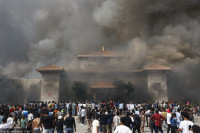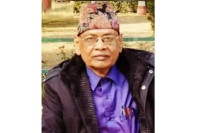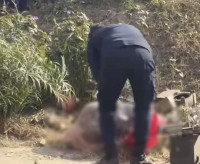Valley
Displaced families brace for cold winter
Twenty-three-year-old Urmila Shahi lost her home to the April 25 earthquake. She has been living in a makeshift shelter built with zinc sheets since.
Prahlad Rijal
Twenty-three-year-old Urmila Shahi lost her home to the April 25 earthquake. She has been living in a makeshift shelter built with zinc sheets since. With the onset of winter, Shahi is increasingly worried - more for her one-year-old baby than for herself. “We are sleeping on the floor. It is extremely cold, and I fear that my child might get pneumonia,” says Shahi. “I think government has forgotten us.”
Shahi and 855 families in Khokana municipality in Lalitpur, one of the worst affected areas near the Capital, managed makeshift shelters after their houses were destroyed by the earthquake.
Even after seven months, the debris of destroyed and partially destroyed houses can be seen in the area. Open spaces in the Khokana area are dotted with makeshift shelters built with zinc sheets and bamboos. Winter has added to woes of families living in these temporary shelters. They say they do not have warm clothes and blankets.
“My family is living in a makeshift shelter with no proper sanitation facility. The metal factory where I work is on the verge closure,” said Keshram Maharjan, a local factory worker and vegetable vendor. Shortage of fuel and essential supplies has made it hard for Maharjan to eke out a living. He says he walks around eight kilometres to Patan everyday to sell vegetables.
The delay in rehabilitation and reconstruction has forced some families to move back to their badly damaged homes to protect themselves from cold.
A rehabilitation and reconstruction committee has been formed at the local level to begin reconstruction work. But even the committee seems to have split into two groups. But much like the national politics, even politicians at the local level are interested in controlling the reconstruction fund than helping the people, locals say.
One of the leaders of the Khokhana Rehabilitation and Reconstruction Committee, Rabindra Maharjan, however is optimistic that work will begin soon.
“Although we have not received any significant support from the government, various donor agencies and individuals have come forward to support us,” Maharjan says. “Survey and feasibility study has been completed for the reconstruction work to begin.”




 13°C Kathmandu
13°C Kathmandu











